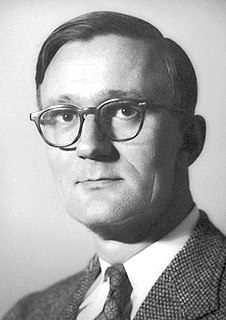A Quote by Kitty Ferguson
We don't know how large a proportion of the significant evidence about the universe is excluded by science. Perhaps hardly any. Perhaps so great a proportion that any body of knowledge which excludes it is hardly more than a caricature. Perhaps something in between - so that science finds truth but not the whole truth.
Related Quotes
How is it that hardly any major religion has looked at science and concluded, “This is better than we thought! The Universe is much bigger than our prophets said, grander, more subtle, more elegant?” Instead they say, “No, no, no! My god is a little god, and I want him to stay that way.” A religion, old or new, that stressed the magnificence of the Universe as revealed by modern science might be able to draw forth reserves of reverence and awe hardly tapped by the conventional faiths.
Great artistic talent in any direction... is hardly inherent to the man. It comes and goes; it is often possessed only for a short phase in his life; it hardly ever colors his character as a whole and has nothing to do with the moral and intellectual stuff of the mind and soul. Many great artists, perhaps most great artists, have been poor fellows indeed, whom to know was to despise.
Science seeks the truth. And it does not discriminate. For better or worse it finds things out. Science is humble. It knows what it knows and it knows what it doesn’t know. It bases its conclusions and beliefs on hard evidence -- evidence that is constantly updated and upgraded. It doesn’t get offended when new facts come along. It embraces the body of knowledge. It doesn’t hold on to medieval practices because they are tradition.
...I think the popular view of Science is a solid body of truth, shared by a whole lot of learned men in a room, all agreeing on the answers to the questions of how the Universe works. Whereas nothing could be further from the truth!!! The one truth that I see emerging from the History of Science is that experiment has always surprised theorists. Einstein included!
I have begun to feel that there is a tendency in 20th Century science to forget that there will be a 21st Century science, and indeed a 30th Century science, from which vantage points our knowledge of the universe may appear quite different than it does to us. We suffer, perhaps, from temporal provincialism, a form of arrogance that has always irritated posterity.
But the idea of science and systematic knowledge is wanting to our whole instruction alike, and not only to that of our business class ... In nothing do England and the Continent at the present moment more strikingly differ than in the prominence which is now given to the idea of science there, and the neglect in which this idea still lies here; a neglect so great that we hardly even know the use of the word science in its strict sense, and only employ it in a secondary and incorrect sense.
Curiosity is, in great and generous minds, the first passion and the last; and perhaps always predominates in proportion to the strength of the contemplative faculties. He who easily comprehends all that is before him, and soon exhausts any single subject, is always eager for new inquiries; and in proportion as the intellectual eye takes in a wider prospect, it must be gratified with variety, by more rapid flights and bolder excursions.
Perhaps there may come into my art also, no less than into my life, a still deeper note, one of greater unity of passion, and directness of impulse. Not width but intensity is the true aim of modern art. We are no longer in art concerned with the type. It is with the exception that we have to do. I cannot put my sufferings into any form they took, I need hardly say. Art only begins where Imitation ends, but something must come into my work, of fuller memory of words perhaps, of richer cadences, of more curious effects, of simpler architectural order, of some aesthetic quality at any rate.
We might even invent laws for series or formula in an arbitrary manner, and set the engine to work upon them, and thus deduce numerical results which we might not otherwise have thought of obtaining; but this would hardly perhaps in any instance be productive of any great practical utility, or calculated to rank higher than as a philosophical amusement.
Democrats pride themselves on their commitment to science. Citing climate change, they contend that they are the party of truth, while Republicans are 'denialists.' But with respect to genetically modified organisms, many Democrats seem indifferent to science, and to be practicing a denialism of their own - perhaps more so than Republicans.
































